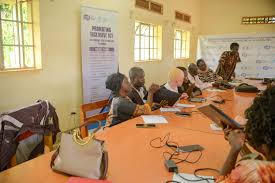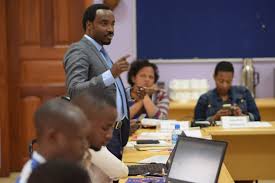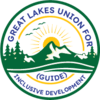

GUIDE and CEDOA Empower Staff through Transformative Media and Digital Literacy Training
Published on July 24, 2025 – Great Lakes Union for Inclusive Development (GUIDE)
In a rapidly evolving digital landscape where misinformation, biased narratives, and digital insecurity threaten civic engagement and advocacy, the Great Lakes Union for Inclusive Development (GUIDE), in partnership with the Centre for Empowerment and Development of the African Child (CEDOA), conducted a dynamic three-day Media and Digital Literacy Training from 18th to 20th July 2025 at CEDOA’s offices in Bulange, Mengo, Kampala.
The training brought together executive directors, communications officers, program staff, M&E professionals, and advocacy leads from both organizations. Through interactive sessions, role plays, multimedia presentations, and hands-on digital storytelling, participants built critical competencies in media engagement, content creation, digital safety, and inclusive communication.
Why This Training Mattered
As development and humanitarian organizations increasingly rely on digital platforms to amplify marginalized voices, shape narratives, and influence public discourse, the need for ethical, secure, and impactful media use has never been greater. A 2022 capacity assessment at GUIDE identified gaps in staff preparedness to counter misinformation, utilize digital tools, and communicate effectively with diverse audiences. CEDOA, with its seasoned media team and in-house media hub, stepped in as an ideal knowledge partner for this much-needed capacity-building effort.
Training Highlights and Impact
Day 1: Foundations of Ethical Media Engagement
Participants explored the basics of media and digital literacy, including the differences between misinformation and disinformation, the structure of the media ecosystem, and the importance of inclusive and gender-sensitive narratives. Through case studies and interactive group work, participants practiced verifying content using tools like reverse image search and fact-checking platforms.
“I now understand how biased reporting affects refugee visibility,” shared one participant after analyzing Ugandan headlines. “We must start telling our own stories—accurately and ethically.”
Day 2: Digital Storytelling and Advocacy Tools
The second day focused on leveraging digital platforms—Facebook, X (Twitter), WhatsApp, blogs—for advocacy. Participants gained hands-on experience using tools like Canva and CapCut to create compelling visual stories. Practical exercises enabled teams to draft sample campaign plans on issues like youth-led refugee inclusion.
87% of participants successfully developed advocacy content during the session, with many committing to apply storytelling frameworks in upcoming campaigns.
Day 3: Cybersecurity and Strategic Media Planning
Digital hygiene, cybersecurity, and impact measurement took center stage on the final day. From password security to phishing awareness and data protection, staff enhanced their digital safety practices. Teams then developed organization-specific Media and Digital Communication Plans with SMART goals, target audiences, content strategies, and KPIs.
“We’ve never had a media plan this detailed,” noted a GUIDE Program Officer. “It aligns perfectly with our mission to promote refugee inclusion and women’s rights.”
Key Achievements
✅ Strengthened Ethical and Inclusive Media Practices
- Over 95% of participants demonstrated improved understanding of media ethics.
- Real-life media cases were critically analyzed, leading to commitments to revise biased communication materials.
- 89% of participants felt confident in promoting peacebuilding through media.
✅ Enhanced Digital Confidence, Especially Among Women
- Women comprised 60% of participants—many with limited prior digital content creation experience.
- Post-training, 87% of women produced their own advocacy graphics or videos.
- Participants pledged to train youth groups, extending the training’s impact beyond the organization.
✅ Developed Two Robust Organizational Media Strategies
- GUIDE and CEDOA each produced tailored media plans with SMART objectives, stakeholder engagement strategies, and monitoring frameworks.
- GUIDE’s plan prioritizes WhatsApp and Instagram for youth engagement; CEDOA’s targets policymakers via X/Twitter.
✅ Boosted Collaboration and Peer Learning
- The training fostered strong inter-organizational bonds.
- Participants co-developed campaigns and exchanged practical solutions during group tasks.
- GUIDE and CEDOA committed to monthly digital media clinics and joint advocacy campaigns moving forward.
Looking Ahead
The energy and commitment displayed by participants underscored the urgent need for continued investment in media and digital literacy across civil society. By equipping staff with the tools and strategies to engage ethically and strategically online, GUIDE and CEDOA are laying the groundwork for more inclusive, accountable, and impactful advocacy in Uganda and the Great Lakes region.
As digital spaces increasingly shape public opinion and policy, GUIDE remains committed to transforming its communications approach—uplifting underrepresented voices and creating narratives that inspire change.
“We no longer see digital media as just a tool—it’s a platform for justice, inclusion, and transformation.” — Farida Karungi, GUIDE Program Officer
For more updates on our digital empowerment initiatives, visit: www.guideug.org
Follow us on X/Twitter: @inclusiveunion | Facebook: @GUIDE.Ug
#DigitalInclusion #MediaForChange #GUIDEUg #CEDOA #EthicalMedia #RefugeeVoices #InclusiveDevelopment
